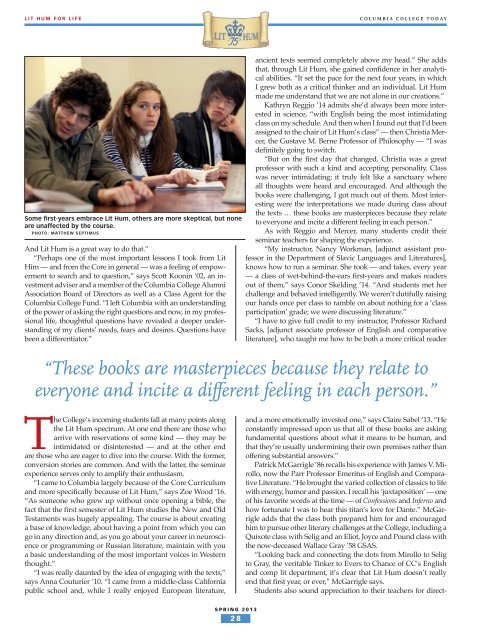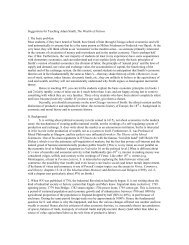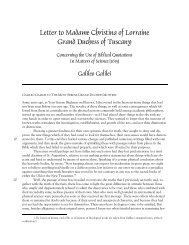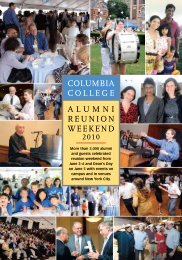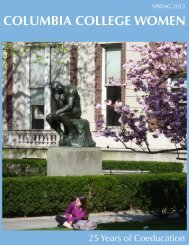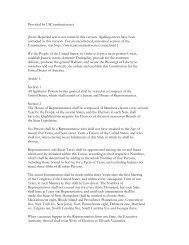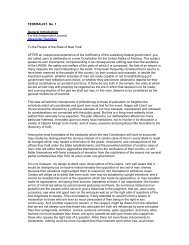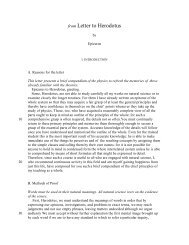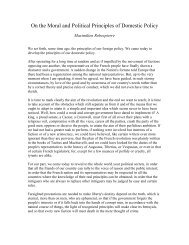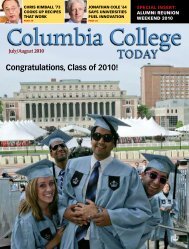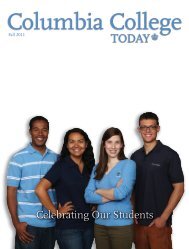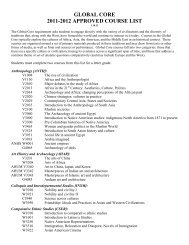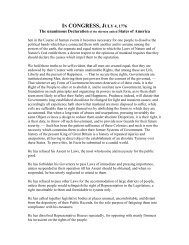Download this issue as a PDF - Columbia College - Columbia ...
Download this issue as a PDF - Columbia College - Columbia ...
Download this issue as a PDF - Columbia College - Columbia ...
You also want an ePaper? Increase the reach of your titles
YUMPU automatically turns print PDFs into web optimized ePapers that Google loves.
LIT HUM FOR LIFE<br />
COLUMBIA COLLEGE TODAY<br />
COLUMBIA COLLEGE TODAY<br />
LIT HUM FOR LIFE<br />
Some first-years embrace Lit Hum, others are more skeptical, but none<br />
are unaffected by the course.<br />
PHOTO: MATTHEW SEPTIMUS<br />
And Lit Hum is a great way to do that.”<br />
“Perhaps one of the most important lessons I took from Lit<br />
Him — and from the Core in general — w<strong>as</strong> a feeling of empowerment<br />
to search and to question,” says Scott Koonin ’02, an investment<br />
adviser and a member of the <strong>Columbia</strong> <strong>College</strong> Alumni<br />
Association Board of Directors <strong>as</strong> well <strong>as</strong> a Cl<strong>as</strong>s Agent for the<br />
<strong>Columbia</strong> <strong>College</strong> Fund. “I left <strong>Columbia</strong> with an understanding<br />
of the power of <strong>as</strong>king the right questions and now, in my professional<br />
life, thoughtful questions have revealed a deeper understanding<br />
of my clients’ needs, fears and desires. Questions have<br />
been a differentiator.”<br />
The <strong>College</strong>’s incoming students fall at many points along<br />
the Lit Hum spectrum. At one end there are those who<br />
arrive with reservations of some kind — they may be<br />
intimidated or disinterested — and at the other end<br />
are those who are eager to dive into the course. With the former,<br />
conversion stories are common. And with the latter, the seminar<br />
experience serves only to amplify their enthusi<strong>as</strong>m.<br />
“I came to <strong>Columbia</strong> largely because of the Core Curriculum<br />
and more specifically because of Lit Hum,” says Zoe Wood ’16.<br />
“As someone who grew up without once opening a bible, the<br />
fact that the first semester of Lit Hum studies the New and Old<br />
Testaments w<strong>as</strong> hugely appealing. The course is about creating<br />
a b<strong>as</strong>e of knowledge, about having a point from which you can<br />
go in any direction and, <strong>as</strong> you go about your career in neuroscience<br />
or programming or Russian literature, maintain with you<br />
a b<strong>as</strong>ic understanding of the most important voices in Western<br />
thought.”<br />
“I w<strong>as</strong> really daunted by the idea of engaging with the texts,”<br />
says Anna Couturier ’10. “I came from a middle-cl<strong>as</strong>s California<br />
public school and, while I really enjoyed European literature,<br />
ancient texts seemed completely above my head.” She adds<br />
that, through Lit Hum, she gained confidence in her analytical<br />
abilities. “It set the pace for the next four years, in which<br />
I grew both <strong>as</strong> a critical thinker and an individual. Lit Hum<br />
made me understand that we are not alone in our creations.”<br />
Kathryn Reggio ’14 admits she’d always been more interested<br />
in science, “with English being the most intimidating<br />
cl<strong>as</strong>s on my schedule. And then when I found out that I’d been<br />
<strong>as</strong>signed to the chair of Lit Hum’s cl<strong>as</strong>s” — then Christia Mercer,<br />
the Gustave M. Berne Professor of Philosophy — “I w<strong>as</strong><br />
definitely going to switch.<br />
“But on the first day that changed. Christia w<strong>as</strong> a great<br />
professor with such a kind and accepting personality. Cl<strong>as</strong>s<br />
w<strong>as</strong> never intimidating; it truly felt like a sanctuary where<br />
all thoughts were heard and encouraged. And although the<br />
books were challenging, I got much out of them. Most interesting<br />
were the interpretations we made during cl<strong>as</strong>s about<br />
the texts … these books are m<strong>as</strong>terpieces because they relate<br />
to everyone and incite a different feeling in each person.”<br />
As with Reggio and Mercer, many students credit their<br />
seminar teachers for shaping the experience.<br />
“My instructor, Nancy Workman, [adjunct <strong>as</strong>sistant professor<br />
in the Department of Slavic Languages and Literatures],<br />
knows how to run a seminar. She took — and takes, every year<br />
— a cl<strong>as</strong>s of wet-behind-the-ears first-years and makes readers<br />
out of them,” says Conor Skelding ’14. “And students met her<br />
challenge and behaved intelligently. We weren’t dutifully raising<br />
our hands once per cl<strong>as</strong>s to ramble on about nothing for a ‘cl<strong>as</strong>s<br />
participation’ grade; we were discussing literature.”<br />
“I have to give full credit to my instructor, Professor Richard<br />
Sacks, [adjunct <strong>as</strong>sociate professor of English and comparative<br />
literature], who taught me how to be both a more critical reader<br />
“These books are m<strong>as</strong>terpieces because they relate to<br />
everyone and incite a different feeling in each person.”<br />
and a more emotionally invested one,” says Claire Sabel ’13. “He<br />
constantly impressed upon us that all of these books are <strong>as</strong>king<br />
fundamental questions about what it means to be human, and<br />
that they’re usually undermining their own premises rather than<br />
offering substantial answers.”<br />
Patrick McGarrigle ’86 recalls his experience with James V. Mirollo,<br />
now the Parr Professor Emeritus of English and Comparative<br />
Literature. “He brought the varied collection of cl<strong>as</strong>sics to life<br />
with energy, humor and p<strong>as</strong>sion. I recall his ‘juxtaposition’ — one<br />
of his favorite words at the time — of Confessions and Inferno and<br />
how fortunate I w<strong>as</strong> to hear <strong>this</strong> titan’s love for Dante.” McGarrigle<br />
adds that the cl<strong>as</strong>s both prepared him for and encouraged<br />
him to pursue other literary challenges at the <strong>College</strong>, including a<br />
Quixote cl<strong>as</strong>s with Selig and an Eliot, Joyce and Pound cl<strong>as</strong>s with<br />
the now-dece<strong>as</strong>ed Wallace Gray ’58 GSAS.<br />
“Looking back and connecting the dots from Mirollo to Selig<br />
to Gray, the veritable Tinker to Evers to Chance of CC’s English<br />
and comp lit department, it’s clear that Lit Hum doesn’t really<br />
end that first year, or ever,” McGarrigle says.<br />
Students also sound appreciation to their teachers for direct-<br />
ing them to the resources of the University <strong>as</strong> well <strong>as</strong> New<br />
York City at large.<br />
“We visited the Met to see Greek and Roman art, attended<br />
a Medea reading at Miller Theatre and watched Oresteia at<br />
the Broadway Theatre,” recalls Caroline Shang ’13E. “These<br />
experiences added another dimension of appreciation for<br />
these works, and I will never forget them.” She notes that <strong>as</strong><br />
an engineering student with the option of taking Lit Hum, it<br />
w<strong>as</strong> no contest: “I w<strong>as</strong> ecstatic about sinking my teeth into<br />
the cl<strong>as</strong>sics.”<br />
Of course, the books themselves are at the heart of<br />
any Lit Hum experience. When <strong>as</strong>ked, most every<br />
student — p<strong>as</strong>t or present — can cite one (or more<br />
than one) that had particular impact.<br />
“The Histories, Don Quixote and Pride and Prejudice had the<br />
greatest impact on me,” says Valerie Comenencia Ortiz ’14.<br />
“One of the greatest things about Lit Hum is that, while it<br />
makes no <strong>as</strong>sumptions about your previous knowledge of<br />
the texts, it takes books and authors that you already seem to<br />
know and shows you an entirely different side of them”<br />
Ramon Giron-Melendez ’14 also points to The Histories: “It<br />
shows that even ‘recorded events’ are triangulated through the<br />
evaluation of a variety of perspectives. I learned that although<br />
our own introspection is an indispensable leap forward to figuring<br />
out life, a variety of examining voices is still needed to discover<br />
an entire truth.”<br />
“I distinctly remember discussing a particular section of Virginia<br />
Woolf’s To the Lighthouse that opened up the novel for me in<br />
a way that deeply touched me and h<strong>as</strong> remained with me since,<br />
and which led me to explore her other novels and discover her<br />
genius,” says Lena Moffitt ’05, who majored in environmental<br />
biology.<br />
“Before coming to <strong>Columbia</strong>, I got my Iliad and thought, cool,<br />
I’m gonna read the book that the movie Troy is b<strong>as</strong>ed on,” Mondesire<br />
says. “But after reading it and discussing it in cl<strong>as</strong>s, I realized<br />
that the epic w<strong>as</strong> so much more than what Hollywood portrayed<br />
it <strong>as</strong>.”<br />
Wood cites Lysistrata. “I found it incredible that the people of<br />
411 BCE were making essentially the same jokes that we make<br />
nearly 2,500 years later. I guess that could be seen <strong>as</strong> disheartening<br />
— should our collective sense of humor have made some<br />
more progress — but I found it to be life-affirming, unifying,<br />
just funny.”<br />
With so many texts, it’s not surprising that many current students<br />
speak to the difficulty of taking in what amounts to a book<br />
a week. But some see benefits to the pace.<br />
“We go from Homeric poems to psychoanalytical 20th-century<br />
fiction — and, instead of feeling your way through the texts, you<br />
have to take the plunge and let the texts confront you,” says Amir<br />
Safavi ’14, a 2011 Core Scholar. “This is both a necessity — there<br />
is simply no time to leisurely muse about your reading — and a<br />
blessing, <strong>as</strong> it encourages us to trust our instincts and heightens<br />
our senses.”<br />
Sarah Fakhry ’14 says the pace w<strong>as</strong> both surprising and enjoyable.<br />
“I did not think it would be possible to do each book justice,<br />
but I w<strong>as</strong> surprised at how much we covered. As a result, I am<br />
now probably one of the best speed-readers! It also w<strong>as</strong> exciting<br />
when we found connections and similarities between the texts,<br />
such <strong>as</strong> the theme of friendship in The Iliad and The Aeneid.”<br />
Lit Hum provides a unifying experience for first-years, who read the<br />
same books at the same time.<br />
PHOTO: MATTHEW SEPTIMUS<br />
Significantly, Lit Hum creates a sense of community on several<br />
levels. It provides, first, a point of connection for firstyear<br />
students <strong>as</strong> they get to know each other and, later, a<br />
reliable source of debate. Many also speak to the comfort<br />
that comes from being in the trenches together through late-night<br />
study sessions.<br />
Hannah Rosner ’14 says one of her favorite memories is camping<br />
out with friends in John Jay’s lounge to study for the Lit Hum<br />
final. “All the freshmen were walking around with these huge<br />
boxes of books, trying to remember what happened in book six<br />
of The Iliad three months ago, and the lounge w<strong>as</strong> full of other<br />
groups doing the same thing.”<br />
Wood echoes the sentiment: “It w<strong>as</strong> nice to be able to come out of<br />
my room at 1 a.m. and say to anyone who happened to be out at that<br />
time, ‘I’m only on book four,’ and receive their much-needed empathy.<br />
It’s not that we all constantly discussed Medea’s plight or Odysseus’<br />
pig-headedness, but the books really do come up in conversation<br />
sometimes, and when they do, everyone h<strong>as</strong> something to say.”<br />
“There is always an opportunity to encounter someone who<br />
is contemplating the readings and engage in a discussion,” says<br />
Justin Brathwaite ’14. “As everyone is reading the same books,<br />
we are all <strong>as</strong>piring to understand the themes at a much deeper<br />
philosophical level. … The course captures the essence of what it<br />
means to be a <strong>Columbia</strong>n, which involves being part of an intellectual<br />
community where all its members debate ide<strong>as</strong> like suffering,<br />
truth and life’s meaning.”<br />
In addition to forging bonds among first-years, Lit Hum connects<br />
all students — current and former — to each other and to<br />
the <strong>College</strong>.<br />
“Lit Hum is the great unifier for <strong>Columbia</strong> alumni, not because<br />
of the conclusions that we arrived at through the texts but by the<br />
act of searching for answers in the words,” Couturier says. “I have<br />
been lucky enough to meet and work with <strong>Columbia</strong> alumni from<br />
many different generations and, while we often differ in our interpretations<br />
and takeaways, we share the camaraderie that comes<br />
from the hard work of critically engaging with the great texts.”<br />
As Reggio puts it, “If anything, talking about Lit Hum is one<br />
conversation I know that I can have with any alumni.”<br />
Alexis Tonti ’11 Arts is CCT’s managing editor.<br />
SPRING 2013<br />
28<br />
SPRING 2013<br />
29


